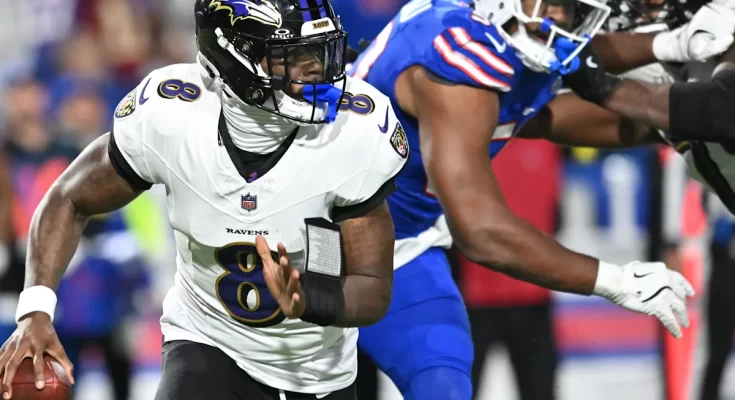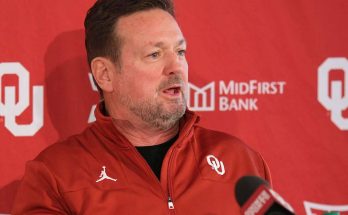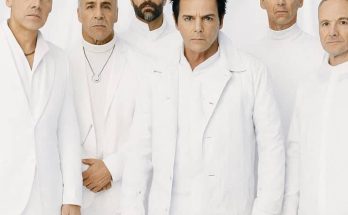Lamar Jackson stood at the edge of the end zone after DeAndre Hopkins had delivered a dazzling one‑handed touchdown catch. The energy was electric. Ravens players, fired up by the score, surged forward, crowding near the barrier that separated players from fans at Highmark Stadium. It was celebration time, pure and simple—then the moment turned unsettling.
A fan in a red Bills jersey reached over and smacked Hopkins’s helmet. It was a jarring, unwarranted action during what was otherwise a moment of jubilation. As Jackson passed by, the same individual extended a slap to his helmet too. The contact registered instinctively—felt more than seen—and Lamar reacted. Without hesitation, he used both hands to shove the fan backward. The fan toppled, responding to Jackson’s force. Security quickly intervened, escorting the fan out, and Jackson’s retaliation went unpenalized by officials.
In the post‑game press conference, Jackson reflected on the incident with candor and poise. “I seen him slap D‑Hop… and then he slapped me,” Jackson recalled, acknowledging he had temporarily forgotten where he was. He paused, collected himself, then provided the key lines that framed his emotional state: “I let my emotion get the best of me. Hopefully, it won’t happen again. I’ll learn from that.” He went on to underscore how important it is to rely on the proper channels—“we got security out there, let security handle it.”
His words weren’t merely a mea culpa; they felt like an earnest commitment to composure. Jackson emphasized that his actions were not meant as a disrespect to fans—but rather a regrettable response born of intensity. “It’s not nothing against the fans. I’m just celebrating when my teammates get a touchdown,” he added, attempting to dissolve any notion that he was agitated at the broader fan base.
His reaction and subsequent apology quickly became a moment of sportsmanship discussion. Reporters framed the incident as a crossed boundary, yet Jackson’s reaction was genuine, human, taught by emotion. The fact he openly acknowledged—“I let my emotion get the best of me”—resonated. It was a line that underscored vulnerability, the kind we don’t often hear from elite professional athletes in those moments.
At the same time, it should be noted how the incident occurred within the bigger picture of that game—one of the most dramatic season openers. The Ravens had surged ahead after Hopkins’s TD, leading 34‑19 late in the third quarter. But the Bills, in a stunning turn, erased the deficit and sealed victory with a walk‑off field goal, winning 41‑40. Jackson himself had played well—throwing efficiently, gaining yards both through the air and on the ground—but could not prevent the collapse. And yet, he still made time to offer accountability for his reactive shove. That willingness to reflect showed depth of character, even amid disappointment over the loss.
As media and fans digested the event, perspectives varied. Some argued that a fan has no right to physically assault players, and Jackson’s response was a natural defense—“fans being in close proximity to players doesn’t grant them license to make contact.” Others cautioned: these are professional athletes, expected to maintain composure, and any retaliation can be awkward. Jackson seemed to grasp that duality. He didn’t absolve himself, but he also stood firm in his humanity—he was provoked, reacted, and will learn.
From that moment on, it became clear: Lamar would grow from this incident. His full admission—let emotions rule for a moment, then learn—made it less about the shove and more about reflection. Those words, “I’ll learn from that,” echoed as a promise. It was an acknowledgment of a need to temper intensity—which is the hallmark of his game—with restraint, especially in chaotic moments when adrenaline surges.
It was also a glimpse into Jackson’s competitive fire and fierce loyalty to his teammates. His reaction came not merely as self‑defense, but as allegiance to Hopkins—“I seen him slap D‑Hop… then he slapped me”—and part of him in that moment was protecting Hopkins’s celebration, and in extension, that team spirit. Yet even with that loyalty, Jackson recognized the wider responsibility he carries, both as a leader on the field and a public figure off it.
In his apology, he didn’t signal for fans to shy away; quite the opposite. Jackson said he probably still would get close again when scoring, recognizing the unique energy players and fans share during end zone celebrations. He made clear: he appreciates the fans, and there’s no lingering resentment—unless they physically cross the line.
That said, it leaves us with a nuanced image: Lamar Jackson, the elite quarterback, powerful, spontaneous, fiery, but also reflective—capable of saying, “I messed up, and I’ll do better next time.” It’s a layered portrait: not merely an athlete reacting, but a person owning up, promising growth. That single line—“I let my emotion get the best of me… I’ll learn from that”—straddles the fragile line between passion and discipline, reaction and rhythm, impulse and introspection.
At 28 years old, a two‑time MVP and perennial Pro Bowler, Jackson isn’t under rookie scrutiny. He’s seasoned. And yet here was a moment that reminded us how even veterans, superstars, can stumble in a flash. What matters is what comes next. His apology offers a blueprint: recognize, reflect, resolve.
As we move forward into the season, that incident will linger in the narrative—but it needn’t define it. It can shape it. It can be the moment when Lamar Jackson learned that sometimes the strongest reaction is restraint, that honoring teammates includes trusting the process (like letting security intervene), and that growth can come from the same heat that fuels performance.
In the aftermath, many will focus on the game’s implosion, the blown lead, the stunning Bills comeback. But that conversation can coexist with this: a quarterback who, in the scramble of adrenaline and circumstance, simply made a mistake—and then owned it. “I let my emotion get the best of me. Hopefully, it won’t happen again. I’ll learn from that.” In those few words, Jackson invited us to see not just the action, but the athlete beneath—capable of both intensity and introspection, determined to get it right.



